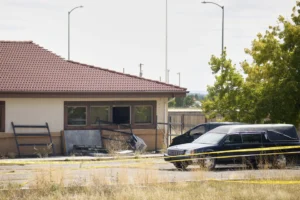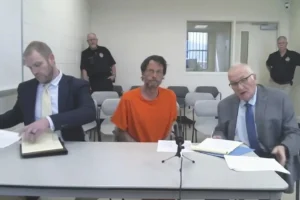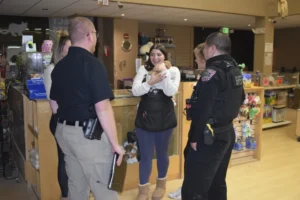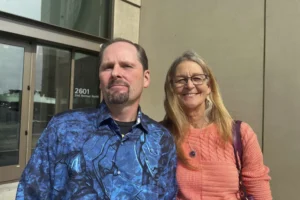Colorado Supermarket Shooter was Sane at the Time of the Attack, State Experts Say
- Published In: Criminal Justice
- Last Updated: May 08, 2024
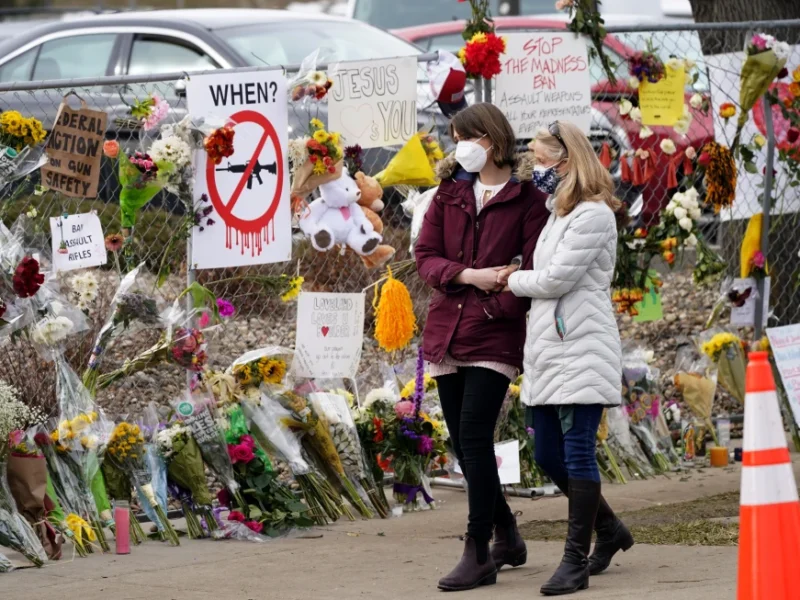
Mourners walk along the temporary fence put up around the parking lot of a King Soopers grocery store where a mass shooting took place earlier in the week, Thursday, March 25, 2021, in Boulder, Colo. State experts have found the man charged with shooting and killing 10 people at a Colorado supermarket in 2021 had untreated mental illness but was legally sane at the time of the attack, lawyers said Tuesday, May 7, 2024. (AP Photo/David Zalubowski, File)
BY COLLEEN SLEVIN
BOULDER, Colo. (AP) — State experts have found the man charged with shooting and killing 10 people at a Colorado supermarket in 2021 had untreated mental illness but was legally sane at the time of the attack, lawyers said Tuesday.
The results of the sanity evaluation of Ahmad Al Aliwi Alissa done at the state mental hospital are not public but were discussed during a court hearing as Alissa, dressed in a jail uniform and his wrists in shackles, and relatives of some of those killed listened.
According to the defense, the evaluators found that the attack would not have happened but for Alissa’s untreated mental illness, which attorney Sam Dunn said was schizophrenia that included “auditory hallucinations.” He also said the evaluators were “less confident” in their sanity conclusion than they would be in other cases but did not elaborate on why.
Prosecutors did not provide any details of their own about what the evaluators found during the hearing. District Attorney Michael Dougherty, who said he is limited to commenting on what has been made public about the evaluation, declined to comment on Dunn’s description of the evaluation’s findings.
“I look forward to the trial, and these are issues that are going to be litigated fully at trial,” Dougherty said after the hearing.
Alissa has pleaded not guilty by reason of insanity in the March 22, 2021, shooting at a King Soopers store in the college town of Boulder. The plea means his lawyers are claiming he did not understand the difference between right from wrong at the time of the shooting and therefore should not be convicted of a crime.
Investigators say he researched how to carry out a mass shooting before he launched his own attack and targeted moving people, killing most of the 10 victims in just over a minute using a gun with a high-capacity magazine.
Alissa’s mental health was raised as an issue by his lawyers right after the shooting, and the issue of whether he was mentally competent to stand trial — able to understand court proceedings and help his lawyers in his defense — put proceedings on hold for about two years. After Alissa was forcibly medicated and then deemed mentally competent to proceed, he entered the not guilty by reason of insanity plea in November.
On Tuesday, Judge Ingrid Bakke granted the defense’s request for Alissa’s sanity at the time of the shooting to be evaluated a second time by their own expert, but she rejected their proposal to delay the trial until March 2025 to give them time for that process. Instead, she delayed the trial by only about a month, scheduling it to start Sept. 2, after hearing strong objections from relatives of the victims and in letters submitted to the court.
As Alissa sat nearby with his lawyers, Erika Mahoney, whose father Kevin Mahoney was killed in the shooting, urged Bakke to allow the families to enter the fall with the trial behind them so they could go on to celebrate Christmas and Hanukkah with that chapter closed.
During a prolonged discussion among the lawyers and Bakke, Erika Mahoney was not feeling hopeful, but she was relieved when the judge only delayed the trial by a month.
“It’s funny the things you that become grateful for,” she said after the hearing, “but I am grateful to know that this is moving forward.”


